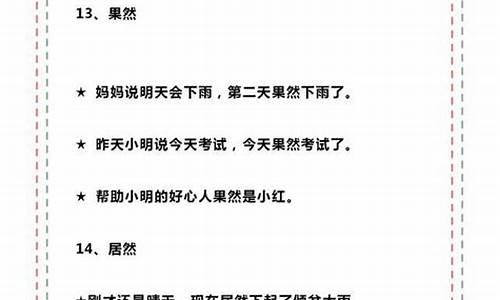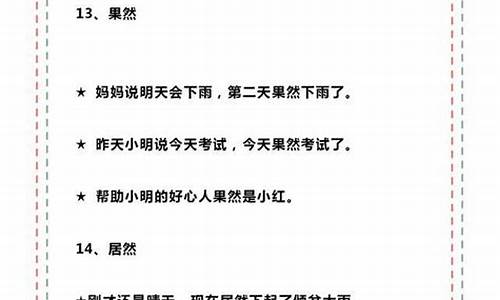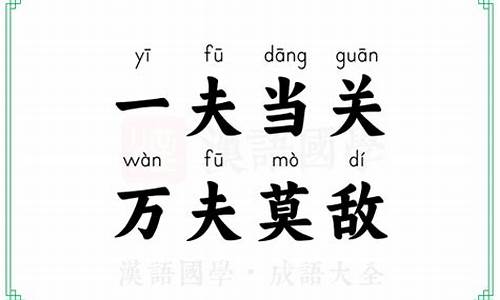三分钟成语故事英文版_三分钟成语故事英文版视频
今天,我将与大家共同探讨三分钟成语故事英文版的今日更新,希望我的介绍能为有需要的朋友提供一些参考和建议。
1.?????ӳ??????Ӣ?İ?
2.2~3分钟英语故事(小学高年级)
3.简单四字成语英文版
4.求英文版成语故事
5.用退避三舍这个成语故事翻译成英语 急求啊

?????ӳ??????Ӣ?İ?
剧名:骗子
5人 Actors:
Tern Keepe:(男主角)
Young Man
Keeper's Wife(女主角)
Young Man
Old Man
Summary:
从前,有一个小酒馆。旅行者和猎人都会在这里把银条兑换成铜币,并且吃一些食物。这个酒馆的老板和他的妻子非常的贪婪。他们总是总是在交易中耍手段,并且欺骗顾客。有一天,他们像往常一样欺骗了一个老人,他们很开心,以为自己得到了一大笔财富。在他们惊喜的时候,一个年轻人偷偷的笑了起来。说道:“看起来这次被欺骗的是你们。”他告诉老板夫妇,这些银条诱惑他们上当了,这个老人是一个老骗子,常年从事银条的欺骗行当。怎么会这样?一个精明的商人竟然被一个老头给骗了。
Once upon a time, there was a tern. Trelers and hunters would exchange silver ingots for copper coins and eat some food there. The tern keeper and his wife were very greedy. They always played tricks on the scales and cheated their customers. One day they played a trick on an old man as usual. They were so hy. They thought they made a big fortune. To their surprise, a young man in the tern began snickering. "It looks like you've been cheated this time." He told them that the silver ingots had lead in them. The old man was a con artist in fake silver for years. How could it be this way? A smart money changer ilke the tern keeper was outwitted by an old man!
Narrator(解说员):
Good afternoon, Ladies and Gentlemen. Today I will tell you a story. Once upon a time somewhere at the foot of the Changpai mountain, there was a tern at which trelers and hunters exchanged money to be used inside and outside the small town. Most people knew that the keeper of the tern and his wife were very greedy. They cheated people by playing tricks on the scales and even charged additional fees for no reasons.
One day~
Scene I
(Customers are talking, laughing and drinking in the tern. A treler just es in, finds a seat and sits down.)
Hunter 1: We hunted many animals today. (laughing) Let's he some more drink.
Hunter 2: Yeahl That's a good idea.
Hunter 1: Let's eat.
Waiter: (sees the treler e in) Wele in, sir. What would you like to order? We he good food here and, of course, good wine, too.
Treler 1: Bring me your best dishes!
Waiter: That's nice, sir. Your food will be here soon.
Treler 2: (walks to the checkout counter) Hey! How much should I pay?
T.O.: It's ten for food, five for wine, and three for the service. It's all cost eigh coins.
Treler 2: What! It's too expensive. You rip me off.
T.K.: If you want to eat free, you will get a misfortune.
Treler 2: (throws some coins on the counter reluctantly and marching out angrily) Don't expect I will e back again.
(Meanwhile, an old man es downstairs and
orders some food before checking out.)
O.M.: Excuse me. May I order now?
T.K.: (walks from behind the counter) Hello! Mydearfriend.Youdidn'tpay me yesterday. It's fifty coins for lodging, thirty-five for food, and five coins for cleaning.
O.M.: (surprisingly) What! I just stayed for one single night. And I he to pay so much money. It's ridiculous!
T.K.: Don't you dare to stay in my tern for free!
(One of the two young men es up to the old man.)
Y.M.1: Calm down, you two. (to the old man respecifully) Uncle Wang, how are you recently?
O.M.: Fine. And you?
Y.M.1: Fine. Thank you.
T.K.: (interrupts their greeting) Pay me first and take your time chatting.
Y.M.1: (to the keeper) Please wait a minute.(turns to the old man)Your son has been doing business with me in Changchou. He wanted me to give you this letter and some silver ingots before I left Chgchou. I did not expect to meet you here. (hands the old man a letter and a bundle of silver ingots) Please take this.
O.M.: Thank you. Do you want to he a drink with me?
Y.M.1: Oh, no. I can't. I he to lee here for another business.
(The young man lees hastily after giving the old man a big bundle of silver ingots.)
O.M.: (to the tern keeper) My son again gives me money as my living expenses. But, please read this letter for me since my eyesight is not as good as it used to be. I he money more than enough now. Could I trouble you to read this letter from my son? I will pay you ten more coins as tips.
T.K.: Why do I he to read this letter for you?
K.W.: (moving from behind the counter) There's nothing to argue about. (pulls the tern keeper aside and whispers to her husband) We don't he any lose.
T.K.: (tears open the letter reluctantly and read the letter)
Dear Father, How are you recently? I am now in Changchou doing business. My wife is pregnant again. kids are all filial to us. They can recite some poems. I'm sorry that I can't trel with you. Afler doing business for three years, I made a big fortune. So here are 50 taels of silver for you. And I think its enough for you to live in fort. I'll be home in two months. ~Nish you well.
Your son
O.M: (giving the bundle to the tern keeper's wife) What a good son! Now take what I owe you and exchange the rest for coins, please.
K.W.: (opens the bundle shockingly) Wait a moment! That's really a big future.
T.K.: (to the old man) All right. You he money now. You can pay us.
K.W.: Well. The silver you ge me is more than you need to pay. Ah..., let me see. (pretends to be weighing the silver ingots on the scales) Mmm.... They're exactly 50 taels. The current exchange rate for 50 taels is 5000 copper coins. You he to pay us 100 coins. So, here are 4000 and 900 coins you keep yourself.
O.M.: That's what my son told me in the letter. So, good-bye now.
K.W.: Waiter.Waiter. Show the gentleman to the door.
(The old man takes the coins and lees the tern.)
K.W.: You can't believe it. That 50 taels of silver weights 60. His son must he been too busy to check the weight. The old man didn't know they could exchange for 6000 copper coins. So we eamlO taels.
T.K.: It's so great . We made a big fortune today.
Y.M.2: (snikering and walking to the keeper)Are yousure about the silver cotent? You'd better check them again.
T.K.: What did you mean by saying that?
K.W.: (cuts open one of the ingots) My gosh I
T.K.: Oh, God! We were cheated. I he to get back my money. Do you know where I can find him?
Y.M.2.: (smiling and putting out his hand over) I know but...
T.K.: No problem. Only if you tell me where to find him and I'll give you a tael of silver ingo
Y.M. 2: A taels?... He is in a town.
T.K.: Tell me more and I'll give you three taels.
Y.M. 2: Three taels? He is in a village.
T.K. : O.K. Five taels and no more.
Y.M. 2: Five taels?... In the east of a village, there is a temple...
T.K. : O.K., O.K. Ten taels and you tell me the exact place.
Y.M. 2: That's a deal.
Hunter 1: Let's go with him.
K.W.: Waiter. Take the scale and go with them
(Most of the customers go along.)
Scene II
(The tern Keeper lees his wife and went to the place the young man described. It's a wine shop. The old man is drinking wine there with lots of people.)
T.K.: So, here you are. You, swindler. You cheated me and you dare to he fun here.
O.M.: Oh, e on my friend. He a dink with me.
(The tern Keeper pushes away the old man's hand.)
T.K.: Don't talk so much. Return my money.
O.M.: Did I cheat you? It was a mistake, my friend.
T.K.: (angrily) Hmm~! You can't deny it! Those pieces of silver ingots you ge me are fake. They're with lead inside.
O.M.: How do you know the silver ingots are mine.
T.K.: Let me show to you.
(The tern Keeper puts the silver ingots on the scales.)
O.M.: (showing the letter from his son to the others) You see. They weigh 60 taels of silver. What my son writes in this letter is 50 taels. Don't fool me. These are not the silver ingots I ge you.
T.K.: I I this this...
Onlookers: (grabs the tern keeper and beat him hard) You are not honest. And you are trying to buff this poor old man. Let's throw him out.
(Light dims out)
Scene III
(The tern Keeper lees the village wearily.)
K.W.: (expecting his husband) Oh! My goodness! What hened to you?
T.K.: S talking to me. Close the door.
K.W.: What hened, my dear?
T.K.: Just close the door. It's my decision.
(The tern Keeper utters the sentence dismally.)
K.W. : I'm asking you what hened to you! Why are you so upset!
T.K.: l... Do you believe it? I was made a fool of by the old man.
K.W. : Oh oh ! My goodness! How could it be? Oh -'.
T.K.: Now you can understand why I am so upset,
K.W.: I am as angry and sad as you are? Why are you mad with me?
T.K.: (shouts at his wife) Those two guys outwitted us. Just be quiet.
K.W.: (dismally) You! You!
(To the surprise of the couple, the old man ears in a smoke suddenly.)
O.M.: Look at me closely and see who I am.
T.K.: (surprisingly) How How e you are here?
O.M.: Don't be afraid! You are in a dream. Tell you the truth. I am a god and both of the two young men are my sons.! came here to teach you a lesson. Don't deceive people any more, my friend! Do your business honestly. You will suffer from what you do if you don't s cheating people.
(Finishing his advice, the old man disears in a smoke.)
T.K.: I don't dare to deceive people any more.
K.W.: Yes! Me too!
Scene IV
Treler 4: May I get my bill?
T.K.: Won't you stay longer? Don't you satisfy with our service?
Treler 4: No. No. Everything is great.
T.K.: All right. Please wait a minuet and he some tea. It's all cost thirty coins.
Treler 4: It's cheap. Thank you very much. You are really a good man. So goodbye now.
T.K.: Goodbye.
Narrator: Ever after, the tern keeper and his wife treated people with kindness. What's more, they even helped poor people in need.
The End
2~3分钟英语故事(小学高年级)
⑴ 小学1--6年级所有的成语故事开卷有益 · 博而不精 · 百发百中 · 捕风捉影
· 必恭必敬 · 百感交集 · 兵贵神速 · 杯弓蛇影
· 不寒而栗 · 不合时宜 · 不自量力 · 不拘一格
· 不可多得 · 不堪回首 · 不可救药 · 别开生面
· 不可同日而语 · 不伦不类 · 伯乐相马 · 班门弄斧
· 白面书生 · 八面威风 · 不名一钱 · 拔苗助长
· 不屈不挠 · 不求甚解 · 髀肉复生 · 病入膏肓
· 不入虎穴,不得虎子 · 拔山举鼎 · 博士买驴 · 冰山难靠
· 背水一战 · 半途而废 · 不贪为宝 · 白头如新
· 百闻不如一见 · 不为五斗米折腰 · 抱薪救火 · 标新立异
· 不学无术 · 不入虎穴,不得虎子 · 不远千里 · 不因人热
· 别有天地 · 不遗余力 · 百折不挠 · 百丈竿头
· 不自量力 · 不知所云 · 宾至如归 · 拔帜易帜
· 残杯冷炙 · 寸草春晖 · 草船借箭 · 乘风破浪
· 才高八斗 · 城狐社鼠 · 沧海桑田 · 草菅人命
· 草木皆兵 · 程门立雪 · 长驱直入 · 车水马龙
· 乘兴而来 · 沉鱼落雁 · 乘人之危 · 车载斗量
· 大笔如椽 · 打草惊蛇 · 雕虫小技 · 大材小用
· 多多益善 · 大腹便便 · 大公无私 · 当局者迷
· 大逆不道 · 大器晚成 · 当务之急 · 开诚布公
· 不得要领 · 抛砖引玉 · 二桃杀三士 · 尔虞我诈
· 罚不当罪 · 奋不顾身 · 分崩离析 · 风吹草动
· 覆巢无完卵 · 分道扬镳 · 奉公守法 · 负荆请罪
· 发奸擿伏 · 返老还童 · 发蒙振落 · 风声鹤唳
· 覆水难收 · 赴汤蹈火 · 分庭抗礼 · 防微杜渐
· 负隅顽抗 · 负重致远 · 管鲍之交 · 各得其所
· 感恩图报 · 过河拆桥 · 刮目相看 · 瓜田李下
· 高枕无忧 · 各自为政 · 华而不实 · 好好先生
· 狐虎威 · 汗流浃背 · 后来居上 · 合浦珠还
· 后起之秀 · 后生可畏 · 火树银花 · 坚壁清野
· 间不容发 · 井底之蛙 · 鸡口牛后 · 江郎才尽
· 见猎心喜 · 鸡鸣狗盗 · 九牛一毛 · 胶漆相投
· 举一反三 · 开诚布公 · 空洞无物 · 沆瀣—气
· 克己奉公 · 开卷有益 · 侃侃而谈 · 口蜜腹剑
· 开门揖盗 · 空前绝后 · 克勤克俭 · 旷日持久
· 困兽犹斗 · 开天辟地 · 口若悬河 · 空中楼阁
· 刻舟求剑 · 脍炙人口 · 狼狈不堪 · 力不从心
· 两败俱伤 · 乐不思蜀 · 老当益壮 · 劳而无功
· 论功行赏 · 老马识途 · 老牛舐犊 · 老妪能解
· 老生常谈 · 梁上君子 · 蓝田生玉 · 滥竽充数
· 狼子野心 · 芒刺在背 · 买椟还珠 · 马革裹尸
· 门可罗雀 · 名落孙山 · 孟母三迁 · 马首是瞻
· 毛遂自荐 · 门庭若市 · 木人石心 · 牛鼎烹鸡
· 怒发冲冠 · 鸟尽弓藏 · 南柯一梦 · 弄巧成拙
· 穷兵黩武 · 宁为玉碎,不为瓦全 · 难兄难弟 · 南辕北辙
· 天真料漫 · 千变万化 · 七步之才 · 庆父不死鲁难未已
· 曲高和寡 · 曲尽其妙 · 千金市骨 · 千钧一发
· 千里鹅毛 · 黔驴技穷 · 千虑一得 · 巧取豪夺
· 七擒七纵 · 杞人忧天 · 曲突徙薪 · 千万买邻
· 犬牙交错 · 千人所指 · 千载难逢 · 气壮山河
· 日不暇给 · 人非圣贤,孰能无过 · 人给家足 · 如火如荼
· 人杰地灵 · 日暮途穷 · 入木三分 · 人琴俱亡
· 人弃我取 · 忍辱负重 · 任人为贤 · 自危
· 如释重负 · 入吾彀中 · 人心如面 · 如鱼得水
· 人言可畏 · 孺子可教 · 手不释卷 · 士别三日
· 死不旋踵 · 师出无名 · 三寸之舌 · 水滴石穿
· 死而不朽 · 伤风败俗 · 三顾茅庐 · 双管齐下
· 死灰复燃 · 十行俱下 · 四海之内皆兄弟 · 尸居余气
· 司空见惯 · 水落石出 · 三令五申 · 四面楚歌
· 三迁之教 · 三人成虎 · 杀身成仁 · 水深火热
· 识时务者为俊杰 · 三生有幸 · 尸位素餐 · 塞翁失马
· 上下其手 · 上行下效 · 随月读书 · 守株待兔
· 三折其肱 · 土崩瓦解 · 同仇敌忾 · 同仇敌忾
· 太公钓鱼愿者上钩 · 同甘共苦 · 同工异曲 · 天经地义
· 天下无双 · 天涯海角 · 天衣无缝 · 一夔已足
· 穷兵黩武 · 庄周梦蝶 · 曾参 · 以强凌弱
· 完壁归赵 · 韦编三绝 · 无出其右 · 为虎作伥
· 刎颈之交 · 无可奈何 · 望梅止渴 · 五日京兆
· 危如累卵 · 万死不辞 · 万事俱备只欠东风 · 五色无主
· 亡羊补牢 · 未雨绸缪 · 妄自尊大 · 下笔成章
· 下车泣罪 · 先发制人 · 兴高烈 · 心旷神怡
· 朽木不雕 · 休戚相关 · 先声夺人 · 小巫见大巫
· 小时了了 · 小心翼翼 · 一败涂地 · 有备无患
· 一不做、二不休 · 一傅众咻 · 一傅众咻 · 以强凌弱
· 饮醇自醉 · 一代楷模 · 一发千钧 · 约法三章
· 以古非今 · 叶公好龙 · 以管窥天 · 言过其实
· 一国三公 · 以规为滇 · 愚公移山 · 一鼓作气
· 一挥而就 · 与虎谋皮 · 异军突起 · 有脚阳春
· 以卵击石 · 以邻为壑 · 夜郎自大 · 一毛不拔
· 一鸣惊人 · 一木难支 · 以貌取人 · 羽毛未丰
· 有名无实 · 一诺千金 · 一暴十寒 · 一窍不通
· 一钱不值 · 予取予求 · 一丘之貉 · 一日千里
· 一日三秋 · 一丝不拘 · 一身是胆 · 以身试法
· 一事无成 · 一网打尽 · 义无反顾 · 一问三不知
· 一误再误 · 月下老人 · 忧心如焚 · 一衣带水
· 一意孤行 · 一叶障目 · 有志竟成 · 一字千金
· 有恃无恐 · 饮鸩止渴 · 自惭形秽 · 专横跋扈
守株待兔:守是 守候、等候 的意思 , “株”是指 露在地面上的树木的根和茎。这个成语的意思是: 守候在树旁,等着捡撞死的兔子。比喻不主动地努力,存着侥幸的心理,希望得到意外的收获。
邯郸学步:故事出自《庄子·秋水》。成语“邯郸学步”,比喻生搬硬套,机械地模仿别人,不但学不到别人的长处,反而会把自己的优点和本领也丢掉。
· 邯郸学步:比喻生搬硬套,机械地模仿别人,不但学不到别人的长处,反而会把自己的优点和本领也丢掉。
· 狐虎威:狐狸借老虎的威势。比喻依仗别人的势力欺压人。
· 百发百中: 形容射箭或打枪准确,每次都命中目标。也比喻做事有充分把握。
· 捕风捉影:风和影子都是抓不着的。比喻说话做事丝毫没有事实根据。
· 杞人忧天:杞国有个人怕天塌下来。比喻不必要的或缺乏根据的忧虑和担心。
· 井底之蛙:井底的蛙只能看到井口那么大的一块天。比喻见识狭窄的人。
· 望梅止渴:原意是梅子酸,人想吃梅子就会流涎,因而止渴。后比喻愿望无法实现,用空想安慰自己。
· 杯弓蛇影:将映在酒杯里的弓影误认为蛇。比喻因疑神疑鬼而引起恐惧。
· 郑人买履:用来讽刺只信教条,不顾实际的人。
· 不合时宜:不适合时代形势的需要。也指不合世俗习尚。
· 守株待兔:原比喻希图不经过努力而得到成功的侥幸心理。现也比喻死守狭隘经验,不知变通。
· 愚公移山:比喻坚持不懈地改造自然和坚定不移地进行斗争。
· 曲突徙薪:把烟囱改建成弯的,把灶旁的柴草搬走。比喻事先取措施,才能防止灾祸。
· 抛砖引玉:抛出砖去,引回玉来。比喻用自己不成熟的意见或作品引出别人更好的意见或好作品。
· 自相矛盾:比喻自己说话做事前后抵触。
· 滥竽充数:比喻无本领的冒充有本领,次货冒充好货。
· 刻舟求剑:比喻不懂事物已发展变化而仍静止地看问题。
· 叶公好龙:比喻口头上说爱好某事物,实际上并不真爱好。
· 亡羊补牢:羊逃跑了再去修补羊圈,还不算晚。比喻出了问题以后想办法补救,可以防止继续受损失。
· 画蛇添足:画蛇时给蛇添上脚。比喻做了多余的事,非但无益,反而不合适。
· 掩耳盗铃:偷铃铛怕别人听见而捂住自己的耳朵。比喻自己欺骗己,明明掩盖不住的事情偏要想法子掩盖。
· 买椟还珠:买下木匣,退还了珍珠。比喻没有眼力,取舍不当
⑵ 适合一年级学生参赛的成语故事有哪些
这些成语故事很多,比如说一些寓言故事还有历史故事。这些都可以的选择一个喜欢的就行。
⑶ 小学一年级英汉双译成语故事:滴水穿石
滴水穿石
水不断下滴,可以闹穿石头。 比喻只要有恒心,不断努力,事情一定成功。专
[拼音]
dī shuǐ chuān shí
[出处属]
宋·罗大经《鹤林玉露·一钱斩吏》:“乖崖援笔判曰:‘一日一钱;千日千钱;绳锯木断;水滴石穿。’”
[例句]
同学们在日常学习中,应该有滴水穿石的精神。
[近义]
水滴石穿 锲而不舍 绳锯木断 孜孜不倦 ...
[反义]
半途而废 浅尝辄止
⑷ 小学一年级英汉双译成语故事:笨鸟先飞
成语来源
The early bird catches the worm
笨鸟先飞
A bird hatches six baby birds.The Sixth is very weak and *** all; his sisters and brothers usually bully him.The other birds usually rob food from his mouth, and the Sixth has to suffer from hunger.
树上一只鸟妈妈孵出了六只鸟宝宝,小六回又瘦又小,哥哥姐姐答们都欺负它;经常从它嘴里抢虫子,小六只得饿着肚子。
Sisters and Brothers call him “clumsy bird.”
哥哥姐姐们都叫他“小笨鸟”。
He determines to exercise more to be healthier, in order to not be laughed by his sisters and brothers.
⑸ 一年级成语故事有哪些
一、坐井观天
在一口废井里,住着一只青蛙。一天,青蛙在井边碰见一只从东海来的海龟。 青蛙自豪地对海鬼夸口说:“你看,我住在这里多么惬意呀!我要高兴,就在井边跳跃游玩,累了就到井壁石洞里休息。
有时把身子舒服地泡在水里,有时愉快地在稀泥中散散步。你看旁边的那些小虫、螃蟹和蝌蚪,它们谁能比得上我呢!我独自占据这口废井,多么自由自在!
先生为什么不经常到井中观赏游玩呢?” 海鬼听了青蛙的一番高谈阔论,就想进入井中看看。可是,它的左脚还没有完全伸进去,右脚就被井栏绊住了。
它只好后退几步,把它看到的大海的情景告诉青蛙:“你见过大海吗?海的广大,岂止千里;海的深度,何止千丈。
古时候,十年里就有九年闹水灾,海水并不因此增多;八年里就有七年闹旱灾,海水却不因此而减少。大海不受旱涝影响,住在广阔无垠的大海里才是真正的快乐。
二、掩耳盗铃
春秋末期,晋国有个叫范吉射的人,家门口挂了一口大钟。在我国古代,钟和铃都是乐器。 一天,有个人到范吉射家里,见到门口的钟,想偷偷地把它背走。但是,钟太笨重了,他根本无法把它背走。后来,终于想出了一个办法:把钟敲碎了,分批拿回去。
于是,他找了一个铁锤,用力去敲钟。“当——”第一下敲上去,钟就发出洪亮悠长的响声;再敲下去,钟发出同样的响声。他想:“钟声一响,人家就知道我在这里敲钟。
这样,钟就要被别人夺走,我也要被人抓住。”于是,他捂住自己的耳朵,这样钟声再响也听不见了,他想既然我离得这么近也听不见,其他人当然更听不见,就可以安全地将钟偷走了。
其实他非常愚蠢可笑:虽然他捂住了耳朵听不见钟声,但别人的耳朵没有被捂住,当然还会听见钟声。 后来,人们就把这个故事概括成“掩耳盗铃”这一成语,来比喻那些自以为是、自欺欺人的人。
三、刻舟求剑
有一个楚国人出门远行。他在乘船过江的时候,一不小心,把随身带着的剑落到江中的急流里去了。船上的人都大叫:“剑掉进水里了! 这个楚国人马上用一把小刀在船舷上刻了个记号,然后回头对大家说:“这是我的剑掉下去的地方。”
众人疑惑不解地望着那个刀刻的印记。有人催促他说:“快下水去找剑呀!” 楚国人说:“慌什么,我有记号呢。”
船继续前行,又有人催他说:“再不下去找剑,这船越走越远,当心找不回来了。” 楚国人依旧自信地说:“不用急,不用急,记号刻在那儿呢。”
直至船行到岸边停下后,这个楚国人才顺着他刻有记号的地方下水去找剑。可是,他怎么能找得到呢。船上刻的那个记号是表示这个楚国人的剑落水瞬间在江水中所处的位置。
掉进江里的剑是不会随着船行走的,而船和船舷上的记号却在不停地前进。等到船行至岸边,船舷上的记号与水中剑的位置早已风马牛不相及了。这个楚国人用上述办法去找他的剑,不是太糊涂了吗?
他在岸边船下的水中,白费了好大一阵工夫,结果毫无所获,还招来了众人的讥笑。 这则故事告诉我们,用静止的眼光去看待不断发展变化的事物,必然要犯脱离实际的主观唯心主义错误。
四、守株待兔
春秋战国时期,宋国有个农夫种着几亩地,他的地头上有一棵大树。一天,他在地里干活,忽然看见一只兔子箭一般地飞奔过来,猛的撞在那棵大树上,一下子把脖子折断了,蹬蹬腿就死了。
这个农夫飞快的跑过去,把兔子捡起来,高兴地说:“这真是一点劲没费,白捡了个大便宜,回去可以美美地吃上一顿了。”
他拎着兔子一边往家走,一边得意地想:“我的运气真好,没准明天还会有兔子跑来,我可不能放过这样的便宜。”
第二天,他到地里,也不干活,只守着那棵大树,等着兔子撞过来。结果,等了一天什么也没等到。
他却不甘心,从此,天天坐在那棵大树下等着兔子来撞死。他等呀等呀,直等到地里的野草长得比庄稼都高了,连个兔子影也没有再见到。
五、亡羊补牢
从前,有个人养了一圈羊。一天早上他准备出去放羊,发现少了一只。原来羊圈破了个窟窿。夜间狼从窟窿里钻进来,把羊叼走了。
邻居劝告他说:"赶快把羊圈修一修,堵上那个窟窿吧!"他说:"羊已经丢了,还修羊圈干什么呢?"没有接受邻居的劝告。
第二天早上,他准备出去放羊,到羊圈里一看,发现又少了一只羊。原来狼又从窟窿里钻进来,把羊叼走了。
他很后悔,不该不接受邻居的劝告,就赶快堵上那个窟窿,把羊圈修补得结结实实。从此,他的羊再也没有被狼叼走的了。
说明:羊丢了,把羊圈修补起来,剩下的羊就不会再丢。犯了错误,立即改正,就能减少错误。遭到失误,及时取补救措施,则可以避免继续出现的损失。
⑹ 小学一年级英汉双译成语故事:对佟33小学
成语: 狐虎威
拼音: hú jiǎ hǔ wēi
解释: :借。狐狸借老虎的威势。比喻依仗别人的势力欺压人。
出处: 《战国策·楚策一》:“虎求百兽而食之,得狐。……虎以为然,故遂与之行。兽见之皆走,虎不知兽畏己而走也,以为畏狐也。”
举例造句: 果然府中来借,怎好不借?只怕被别人狐虎威的诓的去,这个却保不得他。 明·凌濛初《二刻拍案惊奇》卷二十
拼音代码: hjhw
近义词:仗势欺人、狗仗人势
反义词:独步天下、独擅胜场
歇后语: 狐狸跟着老虎走
灯谜: 风顺腋臭浓
用法: 作谓语、定语、宾语;指借机欺压别人
英文:bully people by flaunting one's powerful connections
故事: 很久以前,森林里有只老虎看到一只狐狸就想吃掉它,狐狸大叫:“我是玉帝派来的百兽之王,你如同一起走一走,看看森林里的动物是不是很害怕我。”老虎想也没想就随同前往,果然小动物见了就跑
狐虎威
[词典] (比喻借别人的威势欺压人)the fox assuming the majesty of the tiger -- borrowing power to do evil;(like)a donkey [an ass] in a lion's hide;a fox masquerading as a tiger;assume someone else's authority as one's own;
[例句]“狐虎威”这个成语的意思是借着别人的势力去欺压人或吓唬人。
This idiom means relying on another's power to bully or frightenothers.
⑺ 小学一年级英汉双译成语故事:守株待兔
成语故事:宋国有个农夫正在田里翻土。突然,他看见有一只野兔从旁边的草丛里慌慌张张地窜出来,一头撞在田边的树墩子上,便倒在那儿一动也不动了。农民走过去一看:兔子死了。因为它奔跑的速度太快,把脖子都撞折(shé)了。农民高兴极了,他一点力气没花,就白捡了一只又肥又大的野兔。他心想;:要是天天都能捡到野兔,日子就好过了。从此,他再也不肯出力气种地了。每天,他把锄头放在身边,就躺在树墩子跟前,等待着第二只、第三只野兔自己撞到这树墩子上来。世上哪有那么多便宜事啊。农民当然没有再捡到撞死的野兔,而他的田地却荒芜了。因为没能再次得到兔子,农民自己沦为了宋国的笑柄。
英文翻译
During the period of Warring States, many people lived on farming. One day, a farmer found that a hare bumped against a stump and died because it ran so quickly that it did not see the stump. That a hare bumped into the sump was less likely to hen again. However, the farm chose to sit near the stump, waiting for another hare, instead of farming to make a living. Eventually, the farmer starved to death.
Waiting for him
简单四字成语英文版
Buying shoes
A man of the state of Zheng wanted to buy a pair of shoes. He measured his foot and put the measurement on a chair. When he set out for the market he forgot to bring it along. It was after he had found the pair he wanted that this occurred to him.
I forgot the measurement, said he.
He went home to get it but when he returned the market had broken up and he did not get his shoes after all.
Why didn't you try on the shoes with your feet?
He was asked.
I 'd rather trust the measurement than trust myself. (《Hanfeizi》)
郑人买履
从前,郑国有个人想买双鞋。他量好了自己脚的尺码,把它放在了椅子上。可当他赶往市集时,却忘了带量好的尺码。他要买鞋时,才想了起来。
他说:"我忘带尺码了。"
他回家去取量好的尺码。 等他赶回来时,市集已经关了,他还是没能买到鞋。
有人问:"为什么不用你自己的脚去量鞋子呢?"
他说:"我宁愿相信尺码也不相信我自己的脚。" (《韩非子》)
求英文版成语故事
1. 简洁的成语故事(英文版)
郑人买履(A man from the State of Zheng bought shoes)Once upon a time , a man in the State of Zheng went to the market to buy a pair of shoes. Before he left for the market, he had measured his feet with a piece me straw. However , he couldn't find the measurement because he had left it at home . So he had to say sorry to the owner that he had to go home for it, which confused the owner why he didn't try the shoes on with his own feet . The man *** iled to the owner , " I would rather believe in the measuremens than my own feet."。
2. 英语的四字成语keep somebody at arm's length, 形影不离
be on one's back, 卧病在床
make somebody's blood boil, 热血沸腾
Keep one's shirt on, 忍辱负重
Shout something from the roofs , 登高而呼
Be all ears, 洗耳恭听
out of the blue, 猝不及防
at sixes and sevens, 乱七八糟
A bolt from the blue 晴天霹雳
love you love your dog 爱屋及乌
a bad le, 金玉其外,败絮其中
It rains dogs and cats.倾盆大雨
Fish in trouble water.混水摸鱼
Teach fish to swim.班门弄斧
Beat the dog before the lion.杀鸡敬猴
3. 英语的四字词语繁荣昌盛thriving and prosperous爱不释手fondle admiringly爱财如命skin a flea for its hide爱屋及乌love me, love my dog. He that loves the tree loves the branch恨屋及乌:He who hates Peter har his dog.)安居乐业live and work in peace and contentment白手起家build up from nothing / build up from scratch /start from scratch百里挑一one in a hundred / the cream of the crop百折不挠be indomitable半途而废give up halfway lee sth. Unfinished包罗万象all-embracing all-inclusive饱经风霜weather-beaten卑躬屈膝bow and scrape cringe悲欢离合vicissitudes of life背道而驰run counter to run in the opposite direction本末倒置put the cart before the horse笨鸟先飞the slow need to start early必由之路the only way闭关自守close the country to international intercourse变本加厉be further intensified变化无常chop and change fantasticality 变化无常chop and change fantasticality别开生面hing sth. New别有用心he ulterior motives彬彬有礼refined and courteous urbane兵不厌诈in war nothing is too deceitful博古通今erudite and informed不败之地incincible position不耻下问feel not ashamed to learn from one's subordinates不可救药be past praying for beyond redemption不劳而获reap where one has not sown不屈不挠fortitude indefatigability perseverance persevere tenacity不速之客crasher uninvited guest不同凡响outstanding不言而喻speak for itself tell its own story tell its own tale went without saying不遗余力spare no effort spare no pains不以为然not rove object to不义之财filthy lucre filthy pelf the mammon of unrighteousness不亦乐乎extremely不远千里go to the trouble of trelling a long distance不约而同hen to coincide不择手段by any kind of means by hook or crook play hard by fair means or foul不知所措be at a loss be all adrift lose one's head out of one's wits才疏学浅he little talent and learning惨绝人寰extremely cruel沧海桑田time brings a great change to the worlds沧海一粟/九牛一毛a drop in the bucket草木皆兵a state of extreme nervousness层出不穷emerge in endlessly。
4. 英语的四字成语优质解答keep somebody at arm's length,形影不离 be on one's back,卧病在床 make somebody's blood boil,热血沸腾 Keep one's shirt on,忍辱负重 Shout something from the roofs ,登高而呼 Be all ears,洗耳恭听 out of the blue,猝不及防 at sixes and sevens,乱七八糟 A bolt from the blue 晴天霹雳love you love your dog 爱屋及乌 a bad le,金玉其外,败絮其中It rains dogs and cats.倾盆大雨 Fish in trouble water.混水摸鱼 Teach fish to swim.班门弄斧 Beat the dog before the lion.杀鸡敬猴。
用退避三舍这个成语故事翻译成英语 急求啊
According to legend is in the warring states period (475-221 B.C., a farmer, with the lamb, and the lark. Meet a good year, also just eat satisfied wear warm; In a famine, or will be starved. He wants to improve life, but he is too lazy, the courage and especially small, do are lazy and afraid, total want to encounter send the door to windfall. Miracle is finally hening. Autumn day, he was in the field in hunting someone nearby farmland,. The sound of Shouting around the small beast rise and fall, frightened 11-minute run. Suddenly, there was a rabbit, unbiased, a bump dead in his tanabe of roots. That day, he enjoyed a big feast. From then on, he ceases to sow the land. Day and night, observing the miraculous stump, waiting for the miracle. Idiom "waiting", the analogy, paranoia no pain or narrow experience, but not adaptations.
Retreating about Thirty Miles as Condition For Peace
During the Spring and Autumn Period (770-476 B.C.), Duke Xian of the State of Jin Killed the crown prince Sheng because he had heard slanders about Sheng and believed them. He also sent his men to arrest Chong Er, Shen Sheng and believed them. He also sent his men to arrest Chonh Er, Shen Sheng's brother. Hearing the news, Chong Er escaped from the state of Jin, remaining a fugitive for more than ten years.
After innumerable hardships, Chong Er arrived at the State of Chu at last. King Cheng of the State of Chu treated him with high respect as he would he treated the ruler of a state, believing that he would he a vright fuure.
One day, King Cheng of the State of Chu ge a banquet in honoudr of Chong Er. Suddenly, amid the harmonious atmosphere of drinking and talking, King Cheng of the State of Chu asked Chong Er. "How will you repay me when you return to the State of Jin and bee its ruler one day?" After thinking for a moment, Chong Er said, "You he plenty of beauties and attendants as well as jewelry and silk cloth, and the state of Chu abounds in rare brides and animals. What treasure can the State of Jin boast hing to present to your majesty?" King Cheng of the State of Chu said, "You are too modest. Nevertheless, you still he to show your gratitude to me in one way or another, I presume?" Smiling, Chong Er answered, "If I should be fortunate enouge to return to the State of Jin and bee its ruler, the State of Jin would be friendly to the State of Chu. If, one day, there should be a war between the two states, I would definitely order my troops to retreat three SHE (one SHE is equivalent to thirty LI. The LI is a Chinese unit of length equivalent to 1/2 kilometre. And, therefore, three SHE is about thirty miles.) as a condition for peace. If, under that condition, you were still not reconciled, I would he to fight with you."
Four years later, as might be expected, Chong Er returned to the State of Jin and became its ruler. He was none other than Duke Wen of the State of Jin famous in ancient Chinese history. Ruled by him, the State of Jin became increasingly powerful.
In the year 533 B.C., the Chu troops and the Jin troops confronted each other in a battle. Faithful to his promise, Duke Wen of the State of Jin ordered his troops to retreat about thirty miles. After retreating, the Jin troops were stationed at Chengpu. Seeing that the Jin troops were r
好了,今天关于“三分钟成语故事英文版”的话题就到这里了。希望大家能够通过我的讲解对“三分钟成语故事英文版”有更全面、深入的了解,并且能够在今后的生活中更好地运用所学知识。
声明:本站所有文章资源内容,如无特殊说明或标注,均为采集网络资源。如若本站内容侵犯了原著者的合法权益,可联系本站删除。












